Qatar Quake
Fashion Trust Arabia Prize puts a spotlight on local fashion designers
April 1, 2019
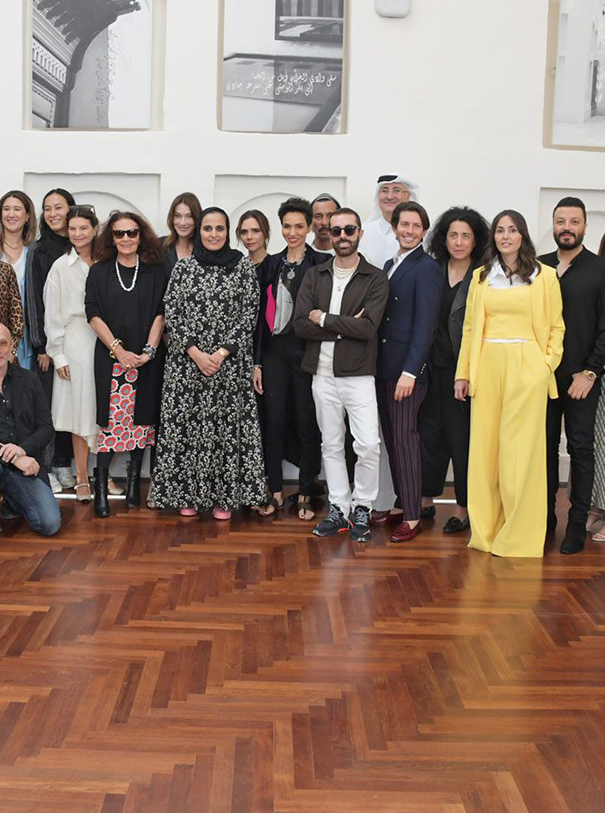
What a trip it was? Achtung came along on an eye-opening experience, which proved that when Qataris are serious, whether it’s fashion or football as with PSG, they are determined to excel. In fact, they excel as they are determined to show to the world that their country stands for excellence and overcoming adversity. But let’s roll back the tape. For nearly two years now its neighboring countries Saudi Arabia, the United Arab Emirates (UAE), Bahrain and Egypt have imposed a blockade on Qatar. While we don’t want to delve too much into politics the Qataris who are holding the football World Cup in 2022 have decided to also enter the fashion world to assert themselves. This is somewhat serious. Qatar has the highest spending power per person in the region and Qataris love luxury fashion. Previously, lots of their money was spent in the UAE but a new patriotism has taken hold and nearly all of the money spent on luxury remains in Qatar now or Europe and the US where Qataris love to travel. It’s well documented that on their quest to diversify their future income – not only oil and gas – they have bought the Paris football club PSG or started a world-class airline from scratch. And now fashion. London based fashion consultant Tania Fares who has successfully worked with the BFC in London to establish the BFC Fashion Trust, which has helped establish brands like Roksanda, Emilia Wickstead or Marques’Almeida had an idea. Why not do the same for the Arab region? So she contacted her friend Sheikha Moza bint Nasser to become Honorable Chair of the new prize Fashion Trust Arabia. Aided by co-chair Sheikha Al-Mayassa bint Hamad Al-Thani, the daughter of Sheikha Moza bint Nasser, the three women put together an impressive line up of fashion talent and judges for the first Fashion Trust Arabia Prize.
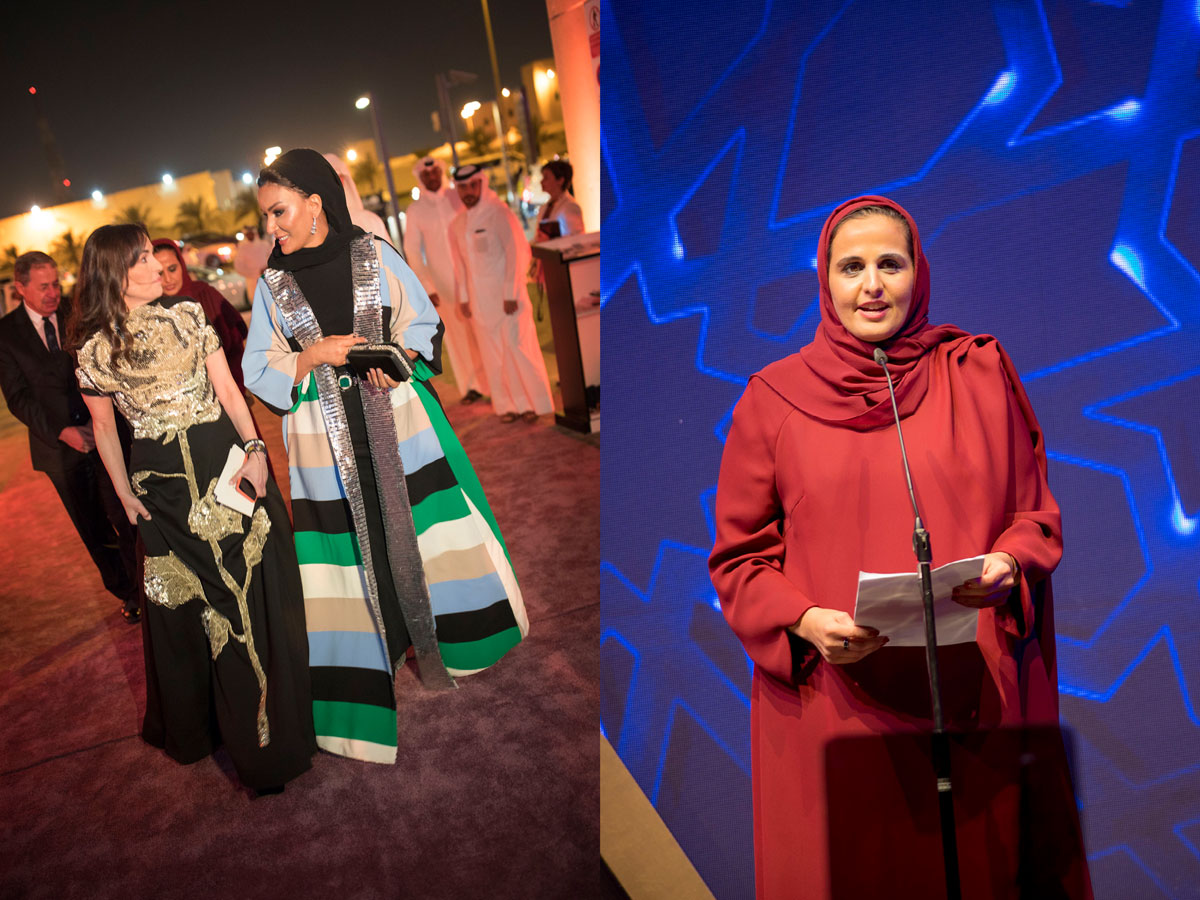
Left: Tania Fares and Sheika Moza bint Nasser at the Fashion Trust Arabia Prize. Right: Sheikha Al-Mayassa bint Hamad Al-Thani speaking at the Fashion Trust Arabia Prize.
Let’s not forget that Qatari-based company Mayhoola owns fashion heavyweights Valentino and Balmain amongst others and is often seen as the dream investment partner by many struggling fashion houses. The Qataris have helped the Roman Haute Couture house to keep up with its big pocketed rival brands like Dior from LVMH and Gucci from Kering when it comes to store openings and product development. At the top end of the fashion game, it’s all about serious cash resources available to stay up to the demanding expansion pace. It’s exorbitantly expensive. No problem for the cash rich Qataris. Just look at PSG. Still not a Champions League winner but during the Qatari-owned period, the club has become one of the biggest names in global football by buying players like Neymar or Mbappé without loosing any sweat.
No surprise that the judging panel was headlined by Valentino’s Pierpaolo Piccioli and Balmain’s Olivier Rousteing. But to show some muscle, Alexander Wang, Diane von Furstenberg or Haider Ackermann and Giambattista Valli were added to the mix by Fares. Even better, Fares arranged a partnership with luxury etailer matchesfashion.com to make sure that the designers would immediately have a commercial platform. The MENA region – to the uninitiated that is the Middle East and North Africa – is heavy on fashion buying power somewhat replacing the BRIC (Brazil, Russia, India and China) countries on international fashion CEO’s priority lists.
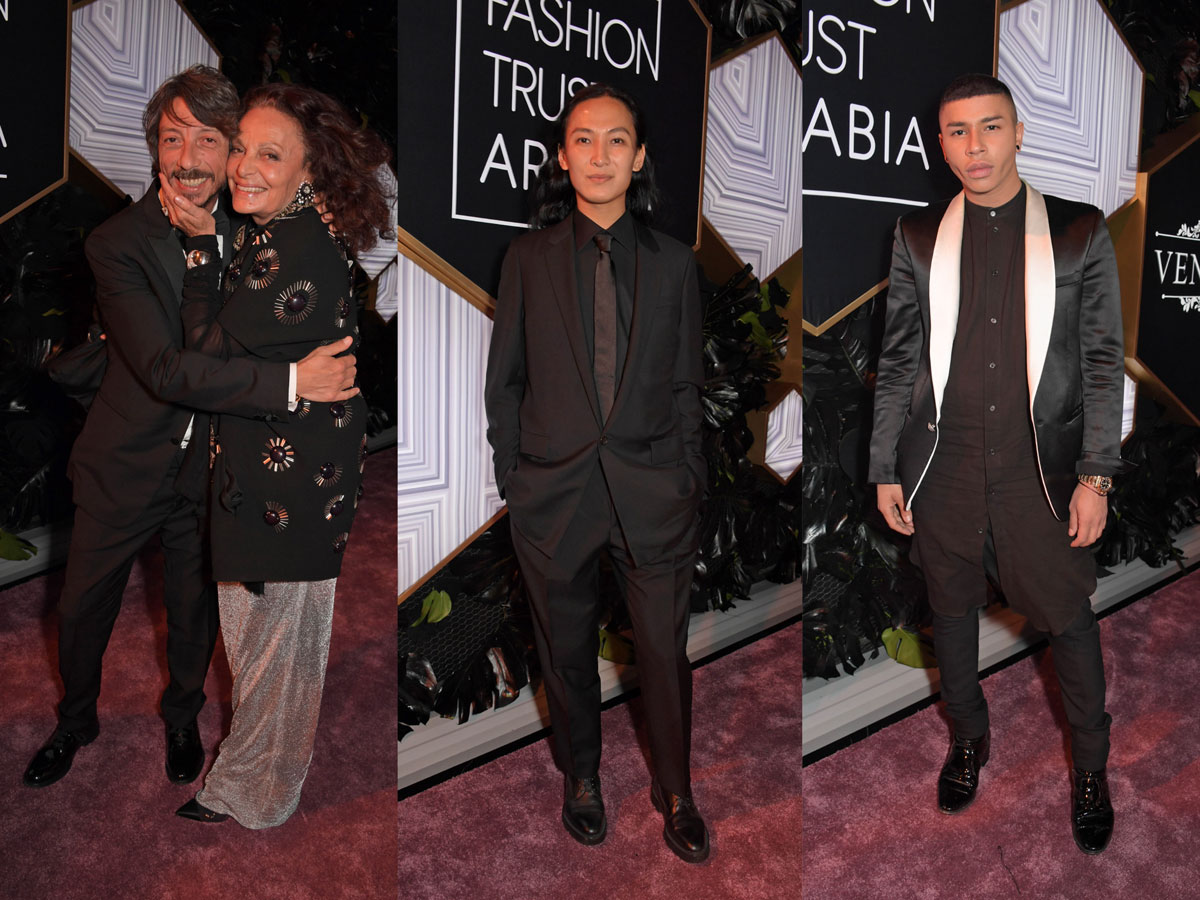
From left to right: Pierpaolo Piccioli, Diane von Furstenberg, Alexander Wang and Olivier Rousteing on the red carpet at Fashion Trust Arabia.
As Arab women love ostentatious party and wedding outfits there were five categories led by Evening Wear, RTW, Accessories as in Shoes and Bags and Jewellery. Designers hailed from mostly Lebanon but also Tunisia, Morocco, Kuwait, Jordan, Qatar and as a nice surprise also from the UAE and Egypt. Fares organized a splendid meet and greet between the judges and flown-in international press like Achtung to evaluate the designers who all applied on FTA’s website only last September.
Visiting international fashion weeks on a regular basis and being an established part of the regular four city seasons in New York, London, Milan and Paris, Achtung was somewhat impressed by the clothes and accessories as we expected much more local offerings. All the designers spoke excellent English and were eager to meet and ask question themselves. Many of them regularly travel to Paris and are keen to make a career internationally and not just in the Arab fashion world. Especially the designers from Beirut were on a very high level, many of them having worked for the Arab fashion world’s superstar Elie Saab.
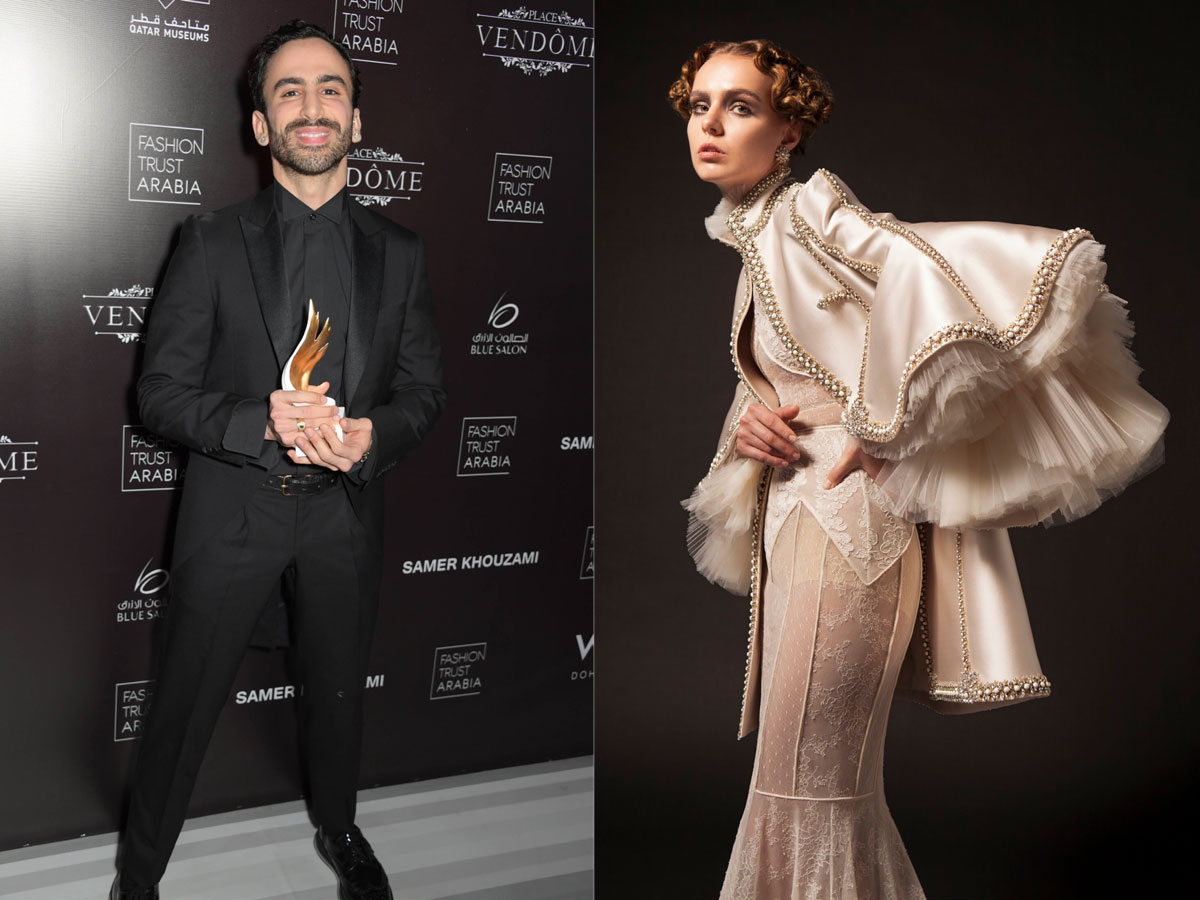
Winning the category of eveningwear: Krikor Jabotian.
So of course the winner in the eveningwear category was Beirut-based Krikor Jabotian who awed with his high level of quality. All his embroideries are done in India and closely supervised from his Beirut base. Very much grounded in the eveningwear world, he has clever ideas like making a dress with a necklace where the jewelry is already part of his dress as embroidery highlighting the torso. Good-looking, well spoken with a financial background business partner, Jabotian is a name to watch.

Winning the Fashion Trust Arabia Prize the category of RTW: Roni Helou.
RTW was won by Roni Helou and Salim Azzam. Both of them outstanding in terms of their concept and delivery. Helou is a vegan and advocate for sustainability. Apart from really saving animals and fostering them with his friends, he tours Beirut to buy dead stock fabrics to use for his collections. We loved his waxed silk evening dresses where he found the fabric from a merchant on his home street. His gabardine safari jacket where the sleeves were made from multiple found fabrics in strong colors like orange gave an unexpected athletic edge to the mostly eveningwear offerings of his competitors. Fellow Lebanese Azzam is determined to bring hand made embroidery back into fashion by not making it decorative – which is its main cultural use – but making them wearable. He is adamant about preserving the craft of embroidery so all his simple shapes like a white shirt are owned by impressive motives of fruit and birds embroideries.
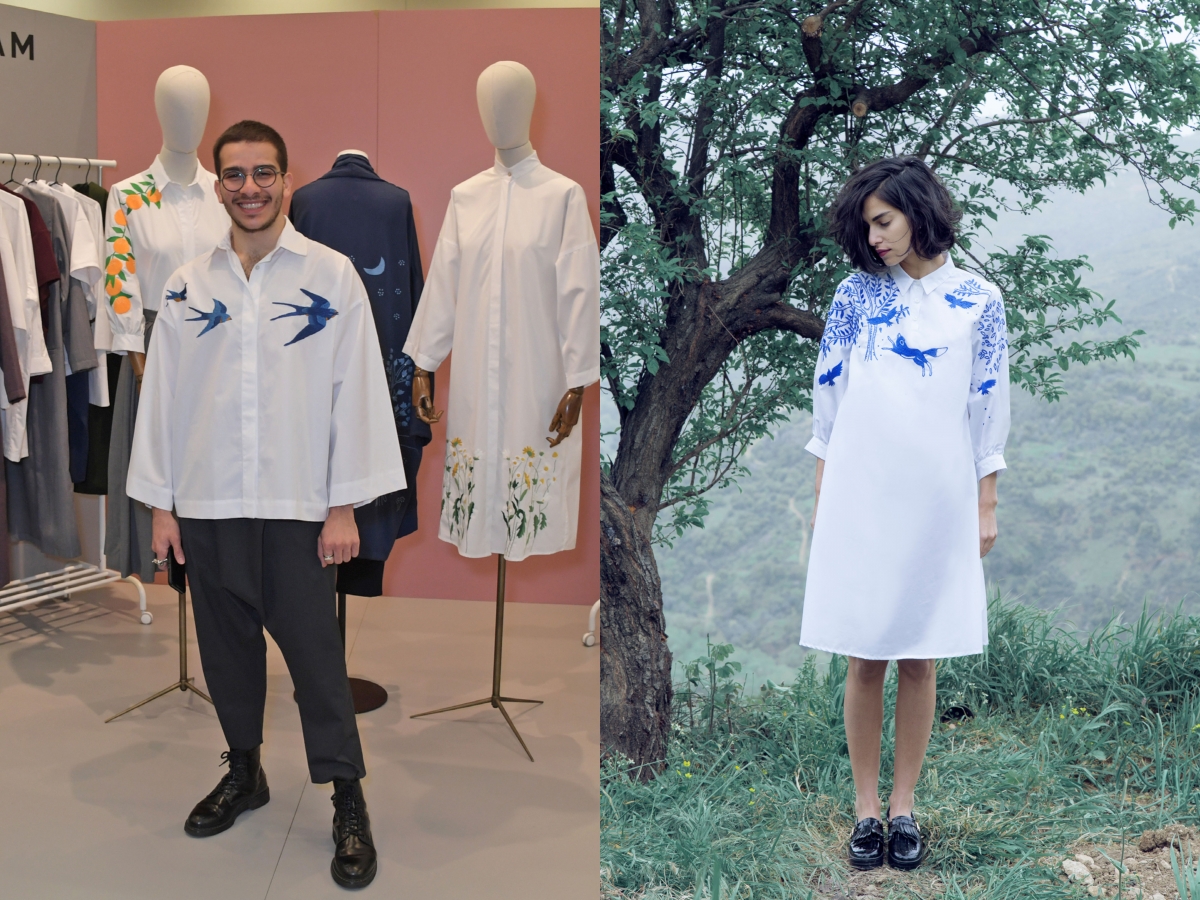
One of two winners in the category of RTW of the Fashion Trust Arabia Prize: Salim Azzam.
Jewellery was won by the Lebanese Mukhi Sisters, shoes by Zyne from Morocco and bags by Sabry Marouf from Egypt.
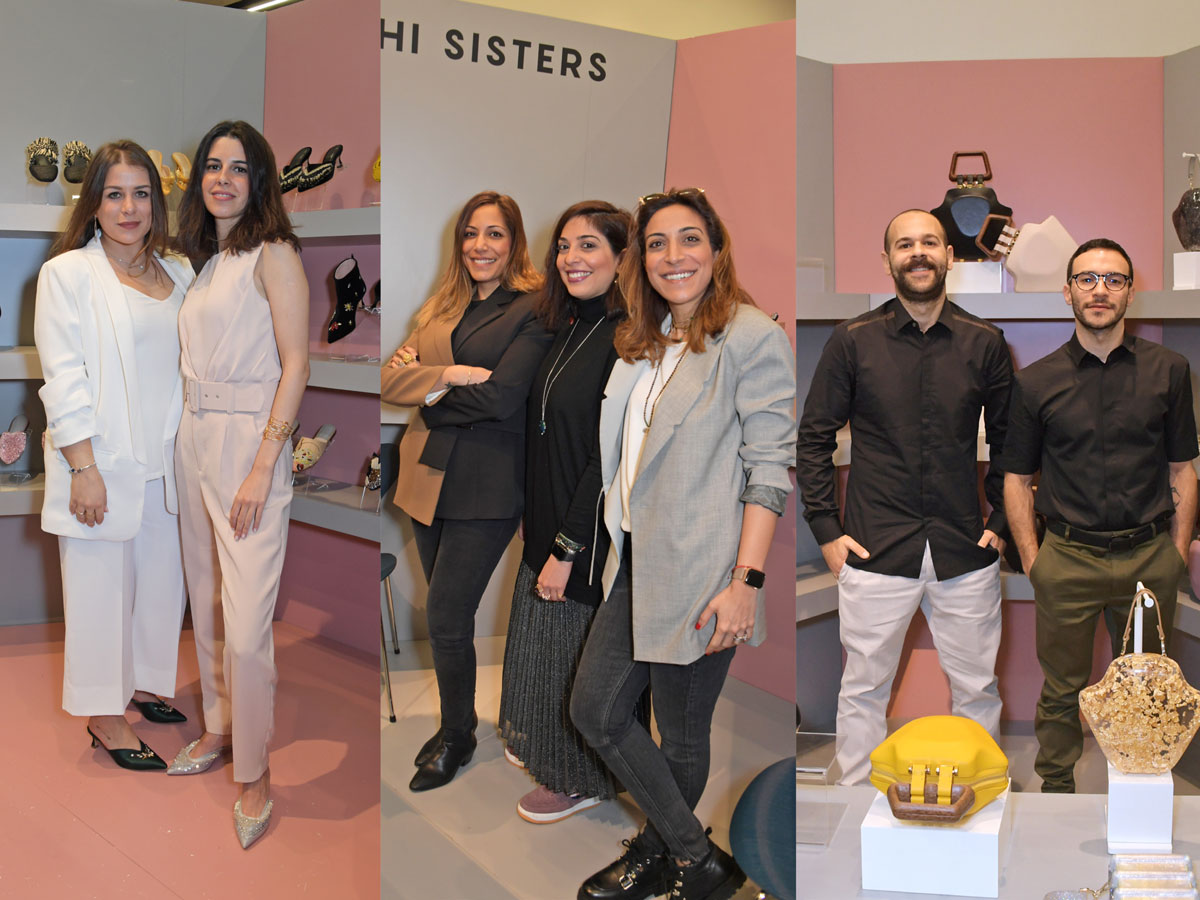
From left to right: The winners of the category accessories: Zyne (shoes), Mukhi Sisters (jewelry) and Sabry Marouf (bags).
Speaking at the celebrity packed awards ceremony at Doha Fire Station – yes, Johnny Depp walked in just like that – Sheikha Al-Mayassa bint Hamad bin Khalifa Al-Thani said: “The launch of the inaugural Fashion Trust Arabia Prize is a joyful accomplishment for our country. It is the only initiative of its kind in the Arab world, creating a space to find, nurture and cultivate the most talented designers on an annual basis. The initiative’s mentorship will help a new wave of MENA talent receive global attention, and I am confident that each of these prize recipients will add dynamism and diversity to the fashion industry.”
While founder Fares added: “It’s immensely exciting to think about what the winners might all be capable of with the mentors and guidance the FTA and its partners will now provide. We hope that FTA will be truly transformative and help to build bridges of understanding between our cultures and others from around the world.”
Power talks.

